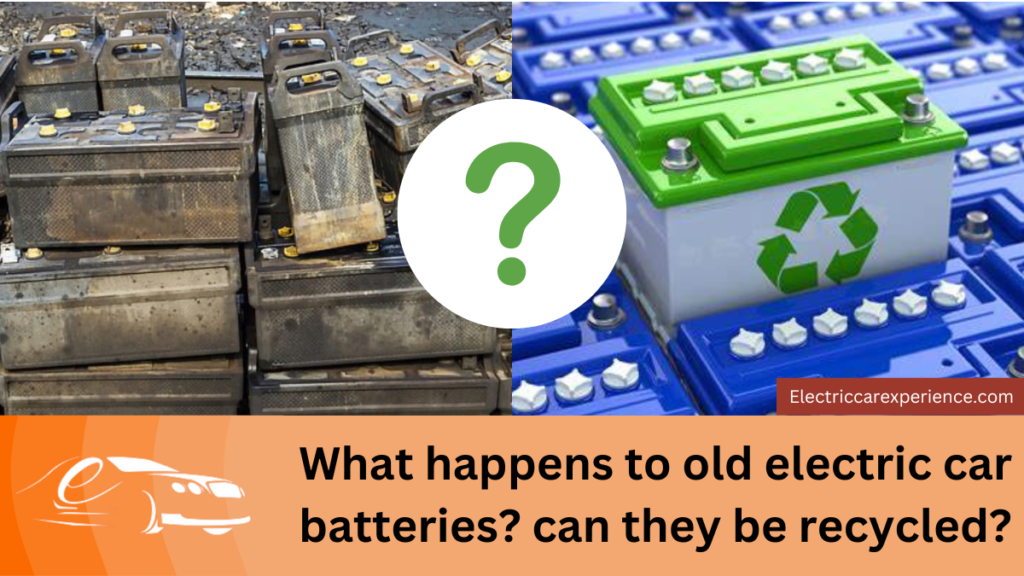
It seems like, after a certain period of time, your electric car battery gets older, and in case you may need to replace your electric car battery. Yet, we need to know lot about electric car batteries and their recycling process also but can electric car batteries be recycled?
Absolutely, when electric car batteries are no longer active, they will be recycled. Most electric car suppliers in the US allow the batteries to be reused a second or third time after the standard 8 to 10-year battery guarantee has passed. The race is on to find ever-better recycling techniques to unleash electric cars’ full green potential as they take the lead on our roads, decreasing greenhouse gas emissions and noise pollution compared to fossil fuel-powered vehicles.
Electric vehicles are the future of the automobile industry. The evolution and adoption of Electric vehicles are much faster than expected. The annual sales of EV companies are breaking records.
The new laws such as in the states of the US, and the UK are aggressive and focus on increasing the number of electric vehicles on the road as soon as possible. While western governments are focusing on electric vehicles, there is much more politics involved. The politics of winning the “battery arms race.” Especially china and the United States are the major players focusing on electric vehicle batteries and trying to capture the resources.
The BCG group’s projections say that electric vehicles will make up 25 percent of the total global sales and 59 percent by 2035.
Such a large amount of electric vehicles will have a large number of new electric vehicle batteries. These batteries will reach the end of their lifespan in the next eight to ten years.
Though electric vehicle batteries last much longer, the warranties of the electric vehicle batteries are currently eight to ten years. So many users will replace the batteries within the warranty period.
In the future, there will be a large number of old electric car batteries which no longer could be used in electric vehicles. What happens to these old electric car batteries?
How Long do Electric Vehicle Batteries last?
An electric car battery lasts for 10 20 years before it needs replacement. In the future maybe the batteries last even longer.
The various manufacturers give warranties for their electric car batteries. The electric car battery will retain its 70 percent battery capacity at the end of the warranty period. But the reality is that the batteries can even last longer, than what is estimated.
| Company name | Warranty Period | Miles |
| Nissan | 8 years (30,40 or 62 kWh) 5 years (24kWh) | 100000 Miles 60000 Miles |
| Tesla | 8 years | 100000 Miles: Model 3 Rear-Wheel Drive |
| Tesla | 8 years | 120000: Model 3 long range Model 3 Performance Model Y long range Model Y Performance 150000: Model S, Model X |
Can Old Electric Car Batteries be Recycled?
Electric car batteries are recyclable and can be reused. The recycling of electric car batteries is an important step in the preservation of our environment.
Recycling electric car batteries is an environmentally friendly way to reuse old batteries that have been discarded by owners who have replaced them with new ones. It also helps reduce the amount of waste that ends up in landfills.
The process of recycling electric car batteries requires the use of advanced technology, which makes it possible for these batteries to be recycled in an environmentally friendly way. The recycling process involves separating the different components that make up a battery from other materials such as steel, copper, aluminum, and plastic.
Recycling electric car batteries also involve the recovery of metals like lead, nickel, iron, and zinc from the spent battery as well as reclaiming rare earth metals like lithium for new applications.
Recycling electric car batteries are better than disposing of them in landfills because it helps reduce greenhouse gas emissions by removing old cars from roads and promoting energy conservation by reducing demand for fossil fuels during transportation
What happens if Old Electric Car Batteries are Exposed to the Environment Without Recycling?

Electric vehicle batteries are different from normal lithium-ion batteries. They are the number of lithium-ion cells packed inside a compact battery. They are hazardous to handle.
Leaching out of the landfills
Lithium-ion batteries in electric vehicles consist of metals including nickel, cobalt, and manganese. These metals are toxic in nature. They can contaminate the water bodies, and the major part of the ecosystem, if they get leached out of the landfills.
The leaching causes the soaking of harmful chemicals into the ground, surface waters, and soil. This ultimately leads to harmful effects on the ecosystem and its components. Animals, humans, and plants get severely affected by the improper disposal of old electric car batteries. The electric car lithium-ion batteries eventually get corroded.

Corrosion
The car batteries get corroded when exposed to the environment. Every car battery can. Though the lithium-ion batteries are sealed, the used old lithium batteries are prone to damage because of mishandling.
The corrosion occurs due to the interaction of the metals, and fluids with the oxygen and other gases in the air. Also, moisture plays an important role in the corrosion of electric car batteries.

The lithium-ion batteries contain electrolytes, along with metals. The metals are copper, nickel, cadmium, lithium, etc. Also, the electrolytes contain salts, acids, etc. All of these are prone to corrosion over the course of time.
Fires
Thus disposal of the electric vehicle batteries is something that impacts the environment. The improper disposal of the lithium-ion-batteries is causing fires. There are several cases of corroded batteries in electric vehicles causing fires. Lithium-ion batteries are already prone to fires. As they get corroded over time they react with the environment and can cause fires.
The EPA report named An Analysis of Lithium-Ion Battery Fires in Waste Management and Recycling, examined the 64 waste management facilities between 2013 to 2020. The 245 fires were caused by lithium-ion batteries ranging from landfills to MRFs.

An older GAIACA report mentioned that, Of the 26 waste management facilities in California, 83% were reported as having at least one fire over a couple of years. 65% of them were due to the batteries. And 40% of this 65% was due to lithium-ion batteries.
Definitely, this data does not represent all the fires caused due to lithium-ion batteries and electric car lithium-ion batteries. There is no such concrete data that how much percentage of the lithium-ion batteries from electric cars caused fires due to improper disposal. Many of them remain non-reported.
Reported cases suggest that lithium-ion batteries can cause fire when they get corroded or improperly disposed of. Despite the environmental cost of improper disposal of lithium-ion batteries, the rate of recycling is still relatively low, as recycling processes remain costly and immature.
How to Dispose of Old Electric Car Batteries?
Old electric car battery disposal is the same as the other car batteries. The regulations differ from state to state and country to country. There is not a well-known authentic and established disposal process for electric car batteries. But yeah, you can always dispose of them with the normal disposal procedures of electronic waste.
But that is not recommended. The best way to dispose of an old electric car battery is either reuse them or recycle them. Recycling is the most environmentally friendly way to dispose of an electric car battery.
So there are ultimately 3 ways you can dispose of an electric vehicle battery
- Dispose into the landfills
- Reuse
- Recycle
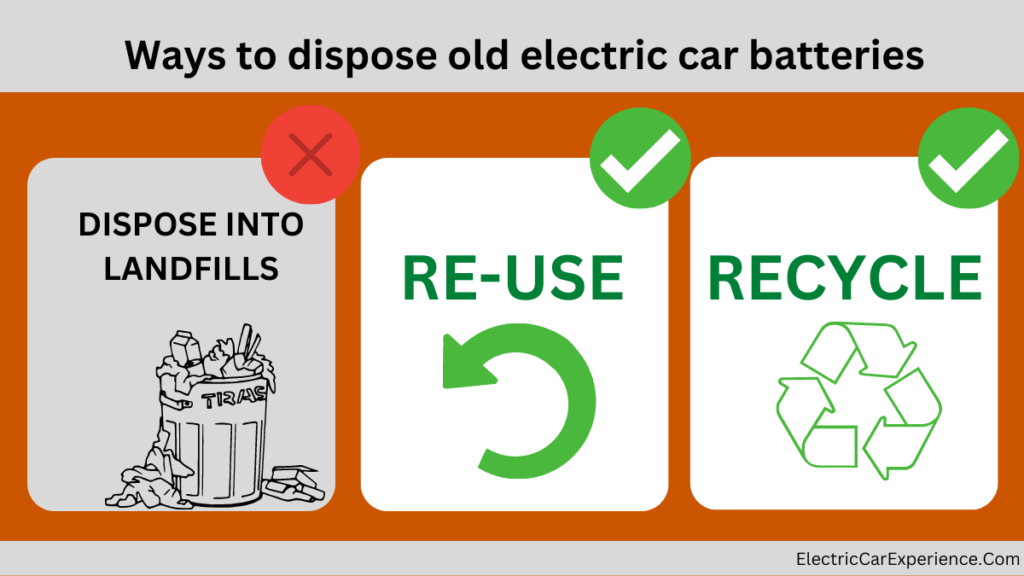
Dispose into the landfills
Disposing of electric car batteries in landfills is not a good way to dispose of electric car batteries, and we don’t recommend it. And also it is not legal to dispose of it directly without the permission of the administration.
Lithium-ion batteries in electric vehicles consist of metals including nickel, cobalt, and manganese. These metals are toxic in nature. They can contaminate the water bodies, and the major part of the ecosystem, if they get leached out of the landfills.
They are also sensitive and prone to catch fires. So in any way, it is not safe to dispose of electric car batteries in landfills. Instead, you can look for further options such as Reuse and Recycling.
Reuse
Well, your electric vehicle battery is no longer able to power your vehicle, but it is not useless. It can be reused in different use cases. Yes, electric car batteries even after losing their major capacity can be re-used in other means. There are several ways to reuse old electric car batteries. Here are they
- Power Home and Office
There is no wonder how the used electric car batteries are used to power your home appliances and the grid. Several inventions have been done which integrate with your electric car battery and make the electric car battery to be used to power the home or office. The electric car batteries can be integrated with the grid to power the appliances. But for that, the electric vehicle battery should have a certain amount of capacity retained.
- Energy storage
Old electric vehicle batteries can be used as a way of energy storage. Why not? Electric car batteries can store energy and then that energy can be distributed to various tasks. Renewable energy from solar panels can be stored in electric vehicle batteries and that energy can be used whenever needed. This will save the cost as well as the environment.
Like On Koshikishima, an island off the coast of southwestern Japan, 4R Energy has created an innovative battery management system that makes it possible for wind and solar energy to power the charging network that supports a fleet of all-electric vehicles.
Think as a larger picture, the millions of used electric car batteries will be repurposed and reused to store renewable energy, which can free a lot of the burden of electronic waste on the land.
- Industrial Reuse
Many electrical vehicle companies are using old electric vehicle batteries in order to repurpose them for other tasks. For example, Nissan leaf is using its old electric car batteries for low-power tasks such as powering security gates, use in forklifts, etc.
Nissan, for example, is now reusing old batteries from its Leaf cars in the automated guided vehicles that deliver parts to workers in its factories. The 4R strategy by Nissan is a great way to show how electric vehicle batteries can be reused, recycled, refabricated, and resold in an environment-friendly manner.
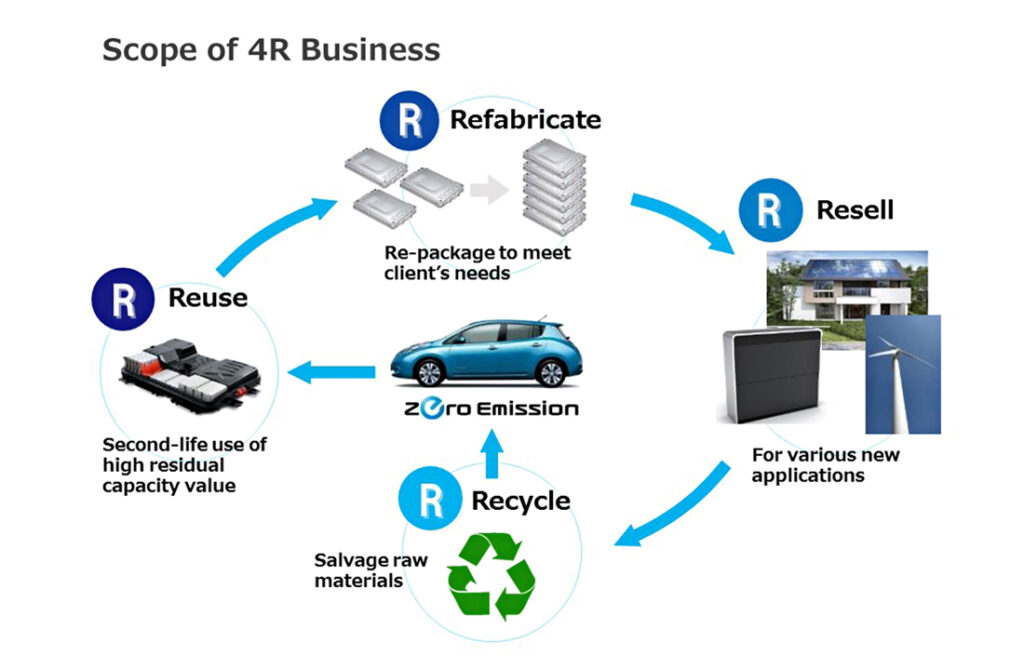
- Resell
The reselling of electric vehicle batteries is another way of repurposing the battery instead of just throwing it away. The used electric car battery if have the appropriate amount of battery capacity retained, and cannot power the electric vehicle but can be used for another purpose.
The various dealers actually need these batteries in order to utilize them for other purposes like the local power grid, and energy storage system. Universities might require one or two such used batteries for a demonstration to their students etc. Some dealers can purchase the battery at lower prices, modify them into a usable form in the other streams and then sell it to the clients.
Recycle

An old electric car battery can be disposed of best by recycling. Recycling is the process where one non-usable product is processed and converted into a usable one.
Old electric car batteries cannot be dumped directly into the land or cannot be thrown away in the trash. They are hazardous to handle, so they need to be disposed of carefully. The most environmentally friendly way to dispose of electric car batteries is recycling.
Lithium-ion batteries are more commonly used in electric vehicles. They contain valuable metals like cobalt, nickel, cadmium, lithium, etc. And also the electrolytes and acids. These metals are valuable in industry and automakers won’t want them to be thrown away into the trash.
These metals are extracted from mines, processed, refined, and then used in electric vehicle batteries. And extracting the metals from millions of electric vehicle batteries again to make new ones, is something that is not good for the environment as well as the automakers. The better way is to recycle the batteries.
Industrial players and automakers have realized the importance of recycling, and thus automakers like Volkswagon, Renaults, and Nissan have already started operations in recycling. Volkswagen recently opened its first recycling plant, in Salzgitter, Germany, and plans to recycle up to 3,600 battery systems per year during the pilot phase.

Renault is also recycling all of its old electric car batteries through Veolia and Solvay. Nissan’s 4R technology is ahead of other automakers as it is entering the 4R strategy with a zero emission goal. These 4R include Reuse, Recycle, Refabricate, and Resell.
Wondering how electric vehicle batteries are recycled, you might get a variety of confusing information. Because the recycling process differs from company to company, however, the overall steps remain the same. Here is How old electric vehicle batteries are recycled, in a simplified manner.
How Electric Car Batteries are Recycled?
Electric car batteries are recycled by dismantling, mechanical separation, hydrometallurgy, refining, and several other processes. Electric vehicle batteries are recycled by different methods based on the organization which is doing it.
Veolia, a transnational french company, recycles old electric car batteries. It uses a five-stage mechanism for the recycling of old electric car batteries. The process is similar in almost all electric car battery recycling firms. Here is the stage-by-stage process of the old electric car battery recycling.
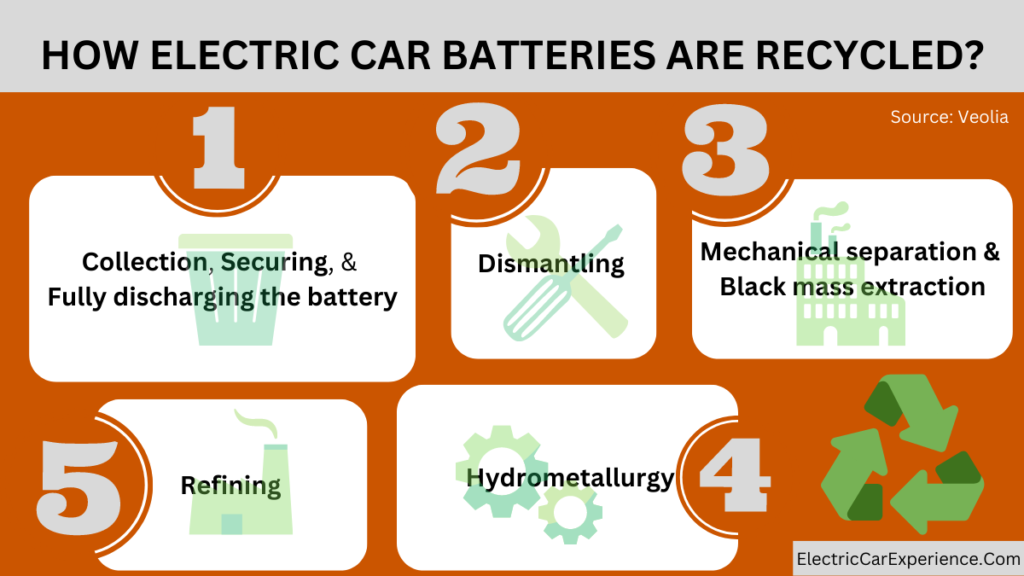
Stage 1: Collection, securing, and fully discharging the battery

The batteries are collected and secured. The batteries are discharged properly. It is ensured that they are secure for the further stage.
Stage 2: Dismantling
In this stage the lithium-ion batteries are dismantled. The dismantling of a lithium-ion battery is risky. The improper dismantling can lead to unfortunate hazards. After the dismantling, the separate components are sent to respective recycling processes.
Stage 3: Mechanical separation & Black mass extraction
The mechanical separation is done to extract the black mass that makes the battery. It can be said as the obtained part is enriched with metals used in batteries, once the batteries are subjected to recycling.
Stage 4: Hydrometallurgy
Hydrometallurgy is a technique within the field of extractive metallurgy, the obtaining of metals from their ores. So in order to separate and purify the metals concentrated in the black mass, hydrometallurgy is used. This separates metals from the black mass.
Stage 5: Refining
The refining is done after the metals are separated from the black mass. As we know in order to use metal in the electric car battery, it needs to be in usable form. So in order to convert the separated metals into their usable form refining is done. Refining makes the metals pure in order to be used in electric car batteries. It is the same process that automakers follow when they extract metals from the mines.
There are three types of batteries used in electric cars, that are Lead-acid, nickel-cadmium, and lithium-ion batteries. Based on the chemical composition, the cost, process and other related factors in electric car battery recycling differ.
Recycling of the Lead-Acid Electric Car Batteries
Lead-acid batteries used in electric cars are generally recycled in a multi-step process. They can be recycled by crushing and smelting the metal (lead). Also, other metals which are present in the lead acid batteries of electric cars are separated.
Once the metals are separated the reusable metals are separated and given into the streams where there is the requirement. The lead can be used in the new lead-acid batteries. The lead is sold to other companies that use lead in various products.
Recycling of the Nickel-Cadmium Electric Car Batteries
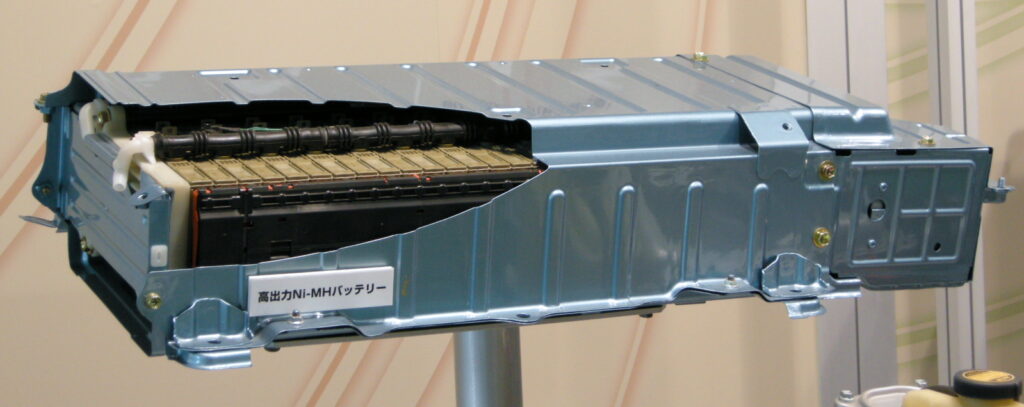
Recycling the nickel-cadmium battery in electric cars, involve the separation of the nickel and cadmium from the battery. These are recycled by crushing and smelting the nickel and cadmium.
The nickel is then given in a separate nickel separation process, where it is purified. After separation nickel is reused.
Recycling of the Lithium-ion Electric Car Batteries
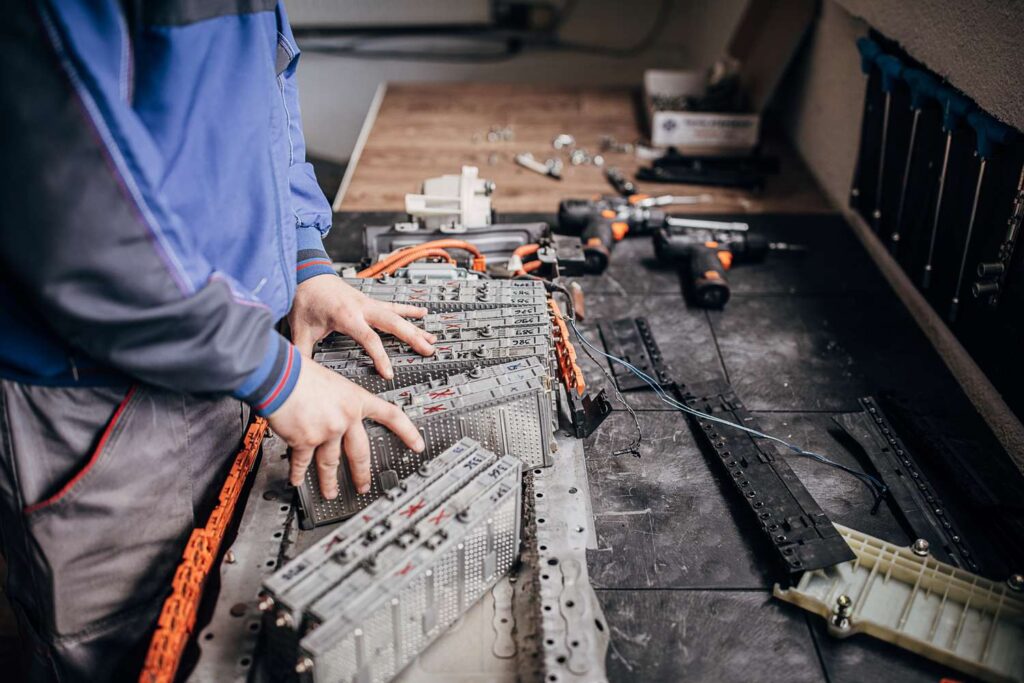
Lithium-ion batteries are difficult and hazardous to recycle. Lithium-ion batteries are recycled manually by some companies while another way is to automate it. They are first discharged completely. The batteries are dismantled.
The separated substances are sent to separation. Then they are subjected to the solvents or burning in order to separate the black mass. The possible valuable materials are separated. The metals are subjected to refining and processing in order to isolate them in usable form. This involves higher costs and risk.
Though recycling is a good way, there are several problems too. Much of the substance is reduced during recycling. The dismantling needs to be done carefully. Doing it manually requires labor, and that can cost you more. If the systems get automated then dangers can be minimized, but the efficiency might reduce.
Also, old electric car batteries are hard to find. Establishing recycling plants and performing the recycling of old electric car batteries is something that is expensive and not in the profit. Only the big players can afford this, and there is still a need for innovations and the establishment of processes for the recycling of old electric car batteries.
Conclusion:
Conclusion#1: Recycling or Reused of Old Electric Car Batteries
Old electric car batteries are basically recycled or reused. The disposal of electric car batteries in landfills is not environmentally friendly as well as not economical too. Repurposing or Re-using the battery are the better options.
Automakers are also involved in the recycling of old electric car batteries and the other players might join the row. The most environmentally friendly way to dispose of electric car batteries is recycling. Recycling an electric car battery is not an easy task.
Conclusion#2: Used of Electric Car Batteries
Electric vehicle batteries can be used to power the grid, and home appliances, to store renewable energy from devices such as solar panels. Industries can use the used old electric car batteries in other products and systems.
Conclusion#3: Recycling Process
It involves several processes such as dismantling, mechanical separation, hydrometallurgy, and refining. The pace of recycling is slow around the globe. Though less recycling efforts out there, those saviors will cover most of the recycling of electric car batteries worldwide.
FAQs
What happens to the Old Batteries from Electric Cars?
Old batteries from electric cars are basically recycled or reused. The disposal of electric car batteries in landfills is not environmentally friendly as well as not economical too. Repurposing or Re-using the battery are the better options. Electric vehicle batteries can be used to power the grid, and home appliances, to store renewable energy from devices such as solar panels.
Are the Batteries in Electric Cars Recyclable?
Electric car batteries are recyclable and can be reused. The recycling of electric car batteries is an important step in the preservation of our environment.
Recycling electric car batteries is an environmentally friendly way to reuse old batteries that have been discarded by owners who have replaced them with new ones. It also helps reduce the amount of waste that ends up in landfills.
Are EV Batteries Bad for the Environment?
EV batteries are bad for the environment if they are not disposed of correctly. Electric vehicle batteries are highly hazardous to handle. Also for the making electric car batteries, lots of mining is done, which is ultimately bad for the environment. Also the disposal of the old electric car batteries in the landfills is bad for the land and the environment.
How do Batteries Affect the Environment?
Lithium-ion batteries in electric vehicles consist of metals including nickel, cobalt, and manganese. These metals are toxic in nature. They can contaminate the water bodies, and the major part of the ecosystem, if they get leached out of the landfills.
They are also sensitive and prone to catch fires. So in any way, it is not safe to dispose of electric car batteries in landfills. Instead, you can look for further options such as Reuse and Recycling.
Posts Related to Electric Cars and Batteries.
- Top 10 reasons why Solid-State batteries are better than Lithium-Ion batteries in EV-A complete guide 2024
- What Does an Electric Car Battery Look Like?
- Tesla Model X 12V Battery Replacement-Complete Guide 2024
- Can A Damaged Piece of Electric Car Battery be Repaired?
- How Long Should a Dead Chevy Bolt Euv Battery be Charged? -An ultimate guide 2024
- Can Electric Car Batteries Explode?
- Does a Lithium-Ion Battery Make Electric Car Expensive?
- Chevy Bolt Battery Health After 1 Year After 2 Years After 5 Years
- Top 9 Ways To Reduce Charging Time For Electric Car
- Tesla Beeping Sound While Parked – (Tesla Model 3, Model X, Model Y, Model S)
- Chevy Bolt Battery Degradation
- What Percentage Should I Charge A Tesla Battery?
